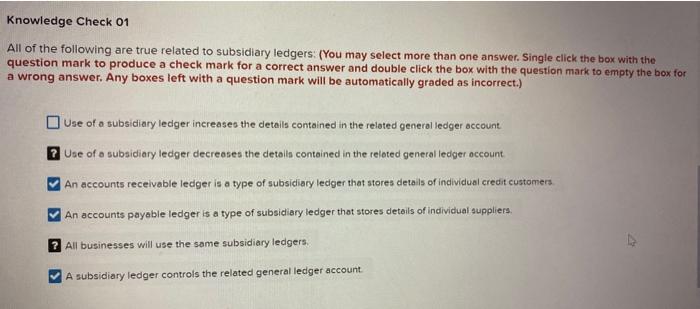All of the following are true related to subsidiary ledgers: they provide detailed transaction tracking, support the general ledger, and enhance the overall accounting system. Subsidiary ledgers are organized by specific accounts or categories, making it easier to manage and reconcile transactions.
In this comprehensive guide, we will delve into the functions, advantages, challenges, and best practices of subsidiary ledgers, providing a thorough understanding of their role in accounting.
Overview of Subsidiary Ledgers: All Of The Following Are True Related To Subsidiary Ledgers

Subsidiary ledgers are detailed accounting records that support the general ledger by providing a breakdown of transactions related to specific accounts. They allow for a more granular level of tracking and control over individual accounts, facilitating more accurate and efficient accounting practices.
The relationship between subsidiary ledgers and the general ledger is hierarchical. The general ledger provides a summary of all financial transactions, while subsidiary ledgers offer a more detailed view of transactions within specific account categories, such as accounts receivable or accounts payable.
Examples of Common Subsidiary Ledgers, All of the following are true related to subsidiary ledgers
- Accounts Receivable Ledger: Tracks customer invoices, payments, and balances.
- Accounts Payable Ledger: Records vendor invoices, payments, and outstanding liabilities.
- Inventory Ledger: Maintains detailed records of inventory items, including quantities, costs, and locations.
- Fixed Assets Ledger: Provides information about individual fixed assets, including acquisition costs, depreciation, and maintenance records.
FAQs
What are the main functions of subsidiary ledgers?
Subsidiary ledgers provide detailed transaction tracking, support the general ledger, and facilitate reconciliation.
What are the advantages of using subsidiary ledgers?
Subsidiary ledgers improve accuracy, control, and efficiency, and enhance the overall accounting system.
What are the challenges of using subsidiary ledgers?
Subsidiary ledgers can be prone to errors and require regular reconciliation, but these challenges can be addressed with proper controls and procedures.


